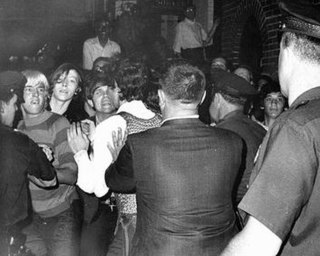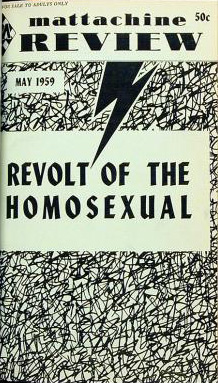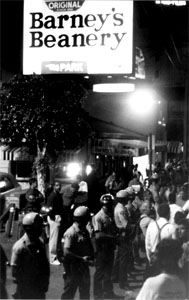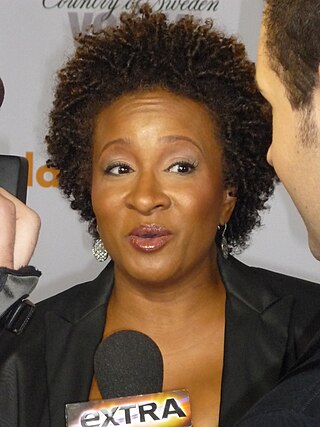
The Stonewall riots were a series of spontaneous riots and demonstrations against a police raid that took place in the early morning hours of June 28, 1969, at the Stonewall Inn, in the Greenwich Village neighborhood of New York City. Although the demonstrations were not the first time American homosexuals fought back against government-sponsored persecution of sexual minorities, the Stonewall riots marked a new beginning for the gay rights movement in the United States and around the world.

The Mattachine Society, founded in 1950, was an early national gay rights organization in the United States, preceded by several covert and open organizations, such as Chicago's Society for Human Rights. Communist and labor activist Harry Hay formed the group with a collection of male friends in Los Angeles to protect and improve the rights of gay men. Branches formed in other cities, and by 1961 the Society had splintered into regional groups.

Quantum Leap is an American science fiction television series, created by Donald P. Bellisario, that aired on NBC for five seasons, from March 26, 1989, to May 5, 1993. The series stars Scott Bakula as Dr. Sam Beckett, a physicist who, believing he has invented a way to travel through time, voluntarily subjects himself to an experiment that he believes will prove the validity of his controversial theories. Sam “leaps” into the fluid of spacetime and apparently disappears forever. However, it is soon revealed that Beckett's consciousness is alive and able to transfer to and inhabit the bodies of other people existing on his timeline. The artificially intelligent computer he created operates with the assumption that in order to return home, Sam must change events in the past in order to "correct" the future course of events, which have somehow been changed in an undesirable way by an unknown agent.

James Allen Whitmore Jr., is an American actor and director, best known for his roles as Captain Jim Gutterman on the television program Baa Baa Black Sheep, Freddie Beamer in The Rockford Files (1977–1979), and Sgt Bernie Terwilliger in Hunter (1984–1986), and since the 1980s as a prolific television director. He is the son of actor James Whitmore.

Michael Patrick Boatman is an American actor and writer. He is known for his roles as New York City mayoral aide Carter Heywood in the ABC sitcom Spin City, as U.S. Army Specialist Samuel Beckett in the ABC drama series China Beach, as 101st Airborne soldier Motown in the Vietnam War movie Hamburger Hill, and as sports agent Stanley Babson in the HBO sitcom Arli$$. He also starred in The Good Fight, the Paramount+ spinoff of The Good Wife.

Sky Mangel is a fictional character from the Australian soap opera Neighbours. She made her first screen appearance during the episode broadcast on 1 February 1989. The character was originally played by Miranda Fryer until 1991. When Sky was reintroduced on 13 August 2003, Stephanie McIntosh took over the role. She departed on 3 August 2007. McIntosh reprised her role as part of the show's 30th anniversary celebrations on 20 March 2015. She returned for a longer stint as part of the 35th anniversary on 13 March 2020, and made an unannounced cameo appearance in the final episode on 28 July 2022, though her appearance was only broadcast in the Australian cut of the episode. McIntosh reprised the role again on 3 July 2024 before departing again on 4 July 2024.
Dr. Samuel John Beckett is a fictional character and the protagonist on the 1989-1993 science fiction television series Quantum Leap, played by Scott Bakula.

Andy Mangels is an American science fiction author who has written novels, comic books, and magazine articles, and produced DVD collections, mostly focusing on media in popular culture. As an openly gay man, he has been a longtime advocate for greater visibility of gay and lesbian characters in various media, especially comics, including the coordination and moderation of the annual "Gays in Comics" panel for San Diego Comic-Con since it was begun in 1988. He is the founder of an annual "Women of Wonder Day" event, which raised over $136,000 in funds for domestic violence shelters and related programs during its seven-year run. As of 2011 he has had three books on the USA Today "best-selling books" list.

A zap is a form of political direct action that came into use in the 1970s in the United States. Popularized by the early gay liberation group Gay Activists Alliance, a zap was a raucous public demonstration designed to embarrass a public figure or celebrity while calling the attention of both gays and straights to issues of gay rights.

The 21st GLAAD Media Awards was the 2010 annual presentation of the media awards presented by the Gay & Lesbian Alliance Against Defamation. The awards seek to honor films, television shows, musicians and works of journalism that fairly and accurately represent the LGBT community and issues relevant to the community. The 21st annual award ceremony included 116 nominees in 24 English-language categories, and 36 Spanish-language nominees in eight categories.

Martha Shelley is an American activist, writer, and poet best known for her involvement in lesbian feminist activism.
"Pool Hall Blues" is a 1990 episode of the American science fiction television series Quantum Leap. Lead character Sam Beckett "leaps" into the body of an African American man in 1954: Charlie "Black Magic" Walters, one of the (fictional) greatest pool players in America, and a childhood mentor of supporting character Al. Beckett as Walters must help Walters's granddaughter keep her Chicago nightclub and rescue it from under the corrupting influence of a criminal loan shark. The episode, the 18th of season 2, was written by Randy Holland and directed by Joe Napolitano. It originally aired on March 14, 1990. The episode won the series its second of three consecutive Primetime Emmy Awards for Outstanding Cinematography.
Equal is an American documentary television series produced by Scout Productions, Berlanti Productions, Raintree Ventures, That's Wonderful Productions, and Warner Horizon Unscripted Television. The four-part series chronicles landmark events and leaders in LGBTQ history, and consists of a mixture of archival footage and scripted reenactments. Equal stars several actors including Samira Wiley, Jamie Clayton, and Anthony Rapp. The series premiered on HBO Max on October 22, 2020.
"Isn't It Romantic?" is the fifth episode of the second season of The Golden Girls. The episode guest stars Lois Nettleton as Jean, a lesbian friend of Dorothy who comes to visit the girls, and who develops a crush on Rose. The episode aired on November 8, 1986 on NBC.
Quantum Leap is an American science fiction television series aired on NBC. Developed by Steven Lilien and Bryan Wynbrandt, it is a revival of the 1989 show created by Donald P. Bellisario. Bellisario, Lilien and Wynbrandt executive produce. It takes place in 2022, thirty years after the original show concluded. The series stars Raymond Lee as the new lead character Dr. Ben Song, along with Caitlin Bassett, Mason Alexander Park, Nanrisa Lee, and Ernie Hudson. Quantum Leap premiered on September 19, 2022. In December 2022, the series was renewed for a second season consisting of 13 episodes, which premiered on October 4, 2023. In April 2024, NBC canceled the series after two seasons.










